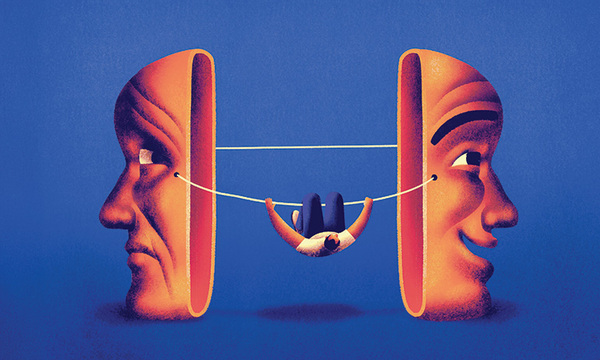It’s one of the most life-altering war wounds that a service member can experience, even though it doesn’t leave a scratch on the body: Post-traumatic stress disorder (PTSD) is a severe mental health condition that can take a tremendous lifelong toll on military veterans and their families — as detailed in two recent books from Biola authors.
And after more than a decade of military involvement in the Middle East, the disorder is on the rise. According to a recent study, about 30 percent of the 834,000 Iraq and Afghanistan veterans who accessed VA health care over the past decade were diagnosed with PTSD. Facing the growing needs, the federal government in August launched a new $107 million research effort aimed at better diagnosing and treating PTSD and mild traumatic brain injuries.
What should we know about the disorder, and what can we do to help those whom it affects? To learn more, Biola Magazine connected with alumni Kelly Orr (Ph.D. ᾽78) and Welby O’Brien ('78), each of whom authored books this year on PTSD and military veterans.
A lot of people who are familiar with the term “post-traumatic stress disorder” may not have a good sense of what the condition actually involves. Can you give us an understanding of what life is like for someone with PTSD?
O’BRIEN: PTSD is rampant, rapidly escalating, and most people have no idea of how severely it affects those who have it — young and old, men and women — as well as all those around them who love them. PTSD can affect everyone, not just veterans. As a result of a severe trauma, they will live as if the impending crisis could reoccur at any moment. They live in constant fear. Braced. Adrenaline always switched on. Staying in that emergency mode 24/7 severely overwhelms the person’s ability to cope. When something triggers them — agitates and stirs up the trauma — they have no reserve with which to handle it in a healthy way as others might. Sometimes it takes all they have to just get up in the morning, and to just make it through the day.
What are some of the most common symptoms or behaviors associated with PTSD?
ORR: The most common symptoms and behaviors include intrusive thoughts and memories often referred to as flashbacks, emotional numbing, avoidance of reminders of the trauma and hypervigilance. However, equally important to recognize are other symptoms like physical fatigue related to sleep loss, nightmares or night terrors; panic attacks or difficulty controlling anxiety; the persistent state of high physical and mental alertness; inability to relax; self-isolation as a protective avoidance of situations or reminders; and the use of alcohol or drugs to self-medicate or block feelings, depression and suicidal thoughts or behaviors.These symptoms and behaviors as a whole or part make up the complicated picture of PTSD.
What sorts of experiences can cause PTSD?
O’BRIEN: PTSD can result from any severe trauma such as an automobile accident, an assault, tragic loss of a loved one, explosion, tornado, witnessing a horrific event or anything that is horrible and shocking or perceived as lifethreatening. At that moment, the body (and the whole person) gets locked into emergency mode — fight or flight survival — and will always be in that emergency mode at some level for the rest of their lives. They will live as if the impending crisis could reoccur at any moment.
Because PTSD is an “invisible wound,” people may not realize just how many military veterans it affects. How widespread is PTSD?
ORR: This is hard to answer because many veterans do not report symptoms. In the general population, the prevalence of PTSD is approximately 7 percent. By contrast, in the military population, depending on number of combat deployments, traumatic brain injury, physical injury and the presence of pain, the numbers range from 17 percent to 30 percent of all veterans from Vietnam to the current Operation Enduring Freedom/Operation Iraqi Freedom (OEF/OIF). Considering that for every affected veteran there is direct impact on at least three and as many as 10 immediate family members and friends, this means at least 4.5 million and as many as 15 million close family friends and members of the immediate family are affected. Pretty widespread!
As your books show, PTSD can take a tremendous toll not only on soldiers, but on their spouses and children as well. What are some of the significant difficulties that families face?
ORR: Probably the most difficult issue is reintegration and adjusting to this “different” person. Kids don’t know if this is a “good” day, or a “bad” day or if daddy is “sick,” so everyone walks on eggshells trying to avoid anything that would trigger an angry outburst, slammed doors, walking out or screaming. Of course, kids are kids and they make noise, so the explosions happen anyway. Wives report feeling exhausted, used up, angry, wanting to leave, tired of the “highly flammable” home life. Spouses, families, parents and children experience shock and confusion, hurt, anger, guilt, fatigue, fear; what is commonly known as secondary acute stress response.
What are the most helpful ways for veterans and their families to treat or cope with PTSD?
O’BRIEN: Part of what is so devastating about PTSD is that it isolates. People often feel so alone. And the irony is that it is connection and support that seem to be what they so desperately need. Bottom line, in the daily challenges of life, what works for me and those around me is connection with God and connection with others — faith and love — and good things start happening. Groundbreaking neurological studies are showing that the PTSD brain actually can change with the right support. Coping can improve and so can relationships. Support for the veterans and support for the loved ones: both are crucial. There are many resources available now (more than ever before in history). Everyone is unique, and different therapies help different people. So I encourage all who struggle with PTSD to explore the options, including the VA and other helpful resources on my website, .
Can life ever go back to “normal” for people affected by PTSD?
ORR: Life has a way of changing what we all consider “normal.” The experiences resulting in PTSD change a person profoundly. In some ways it leads to maturity and a sober appraisal of life that could take years for others who have not experienced trauma. Assumptions about how life is “supposed to be” changes with PTSD. The key to recovery is in facing the loss and not avoiding the traumatic memories. In fact, PTSD appears to worsen with avoidance, so addressing the specifics of the trauma leads to reduction of emotional and cognitive reactivity and normalizing of life for the veteran or otherwise traumatized person. We hear the term “new normal” used to express the way life is now for these individuals and families versus the way it was before the combat or trauma. None of the families we interviewed [for the book] liked that term and I don’t really like it either, because for many of these families “new normal” has the sense of stagnation. I think we all prefer the terms “pressing on” or “moving forward.”
What can all of us — whether as individuals or as church communities — do to provide support to veterans and families dealing with PTSD?
ORR: Veterans and their families need safe places and safe people. They need to know you are there for the long run, not just for the immediate crises. Church communities have the privilege to speak the promises of God into the lives of veterans and their families. I think God has entrusted the Christian community to initiate transformation, which takes time, truth and effort. This is a way to let the veterans and their families know their souls are secure and for believers to be the gospel in action, a “bridge,” directing them to Jesus, the divine healer. I like the term “bridge” because it represents a vital linkage to life-giving resources. There are many Internet resources available through the VA and Defense Centers of Excellence, but one I prefer churches and individuals to consider is the Campus Crusade for Christ division of Military Ministries program, Bridges to Healing Seminars, whose mission is to equip churches to minister to military members and families.
Is there anything we should be especially mindful of when it comes to observing holidays like Veterans Day, which is coming up soon?
O’BRIEN: These holidays can be very stressful to veterans and their loved ones, along with other “anniversaries” that can catapult them right back into the battlefield. Bottom line: Express gratitude for their service and sacrifices, and show respect, kindness, encouragement and support. Many are still wondering why they lucked out enough to come back alive. To be honest, many with PTSD wish they had not come back alive. The torment can be unbearable. Whatever we can do to show support to our veterans and the whole family will truly be appreciated, all year round.
Online Extra
How to Support Veterans and Families Dealing with PTSD
- Be willing to reach out even if it feels awkward. Remember God only uses imperfect people.
- Volunteer at a local Vet Center or charitable organization for veterans.
- Learn all you can about PTSD and how it affects everyone in the family.
- Combine compassion with knowledge. Open your heart wide to those who are struggling.
- Show appreciation and respect to all veterans and service members.
- Pray for them.
- Have a list of resources and contacts for referrals (see for ideas).
- Encourage them and the whole family to get help if they are not already.
- Contribute if possible to the non-profits that minister to them.
- Share a copy of Love Our Vets with your pastoral staff, and with the loved ones of the veteran’s family.
- Remember them during patriotic holidays.
- Share the video on You Tube with them. (It includes a short gospel message that reaches deep into the hearts of the veterans, produced by a Biola graduate along with an anonymous veteran.)
- Welby O'Brien
Kelly K. Orr (Ph.D. ’78) is the co-author of Wounded Warrior, Wounded Home: Hope and Healing for Families Living with PTSD. He has more than 30 years experience in behavioral medicine and pain management. He retired from military service in 2004 with a combined career of 25 years in the Air Force and Marine Corps.
Welby O’Brien (’78), the wife of a veteran with PTSD, is the author of Love Our Vets: Restoring Hope for Families of Veterans with PTSD and founder of the support network Love Our Vets – PTSD Family Support (). She holds a master’s degree in counseling from Portland State University.
 Biola University
Biola University


